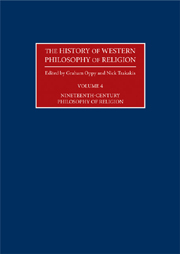Book contents
- Frontmatter
- Contents
- Editorial Introduction
- Contributors
- 1 Nineteenth-Century Philosophy of Religion: An Introduction
- 2 Johann Gottlieb Fichte
- 3 Friedrich Schleiermacher
- 4 G. W. F. Hegel
- 5 Friedrich Schelling
- 6 Arthur Schopenhauer
- 7 Auguste Comte
- 8 John Henry Newman
- 9 Ralph Waldo Emerson
- 10 Ludwig Feuerbach
- 11 John Stuart Mill
- 12 Charles Darwin
- 13 Søren Kierkegaard
- 14 Karl Marx and Friedrich Engels
- 15 Wilhelm Dilthey
- 16 Edward Caird
- 17 Charles S. Peirce
- 18 Friedrich Nietzsche
- 19 Josiah Royce
- 20 Sigmund Freud
- 21 Émile Durkheim
- Chronology
- Bibliography
- Index
2 - Johann Gottlieb Fichte
- Frontmatter
- Contents
- Editorial Introduction
- Contributors
- 1 Nineteenth-Century Philosophy of Religion: An Introduction
- 2 Johann Gottlieb Fichte
- 3 Friedrich Schleiermacher
- 4 G. W. F. Hegel
- 5 Friedrich Schelling
- 6 Arthur Schopenhauer
- 7 Auguste Comte
- 8 John Henry Newman
- 9 Ralph Waldo Emerson
- 10 Ludwig Feuerbach
- 11 John Stuart Mill
- 12 Charles Darwin
- 13 Søren Kierkegaard
- 14 Karl Marx and Friedrich Engels
- 15 Wilhelm Dilthey
- 16 Edward Caird
- 17 Charles S. Peirce
- 18 Friedrich Nietzsche
- 19 Josiah Royce
- 20 Sigmund Freud
- 21 Émile Durkheim
- Chronology
- Bibliography
- Index
Summary
Johann Gottlieb Fichte (1762–1814) was born on 19 May 1762 in Rammenau, Saxony. His parents were farmers who supplemented their income by weaving. Young Fichte showed great intellectual promise, so Baron Ernest Haubold von Miltitz offered to sponsor his education in hope of turning the boy into a fine village parson. Fichte studied at the Universities of Jena, Wittenburg and Leipzig. As a student he was intellectually attracted (and morally repulsed) by material determinism. After von Miltitz's death, Fichte was forced to seek work, but he did not become a village parson. While tutoring a student in Immanuel Kant's philosophy, Fichte decided that transcendental idealism offered a viable theoretical and practical alternative to materialism. He set off on foot to visit his idol in Königsberg.
Fichte wrote his first book, An Attempt at a Critique of All Revelation (1792), in homage to Kant. The book, wherein he denied all miracles or revelation other than immediate moral consciousness, helped him secure a position at the University of Jena. By the time Fichte arrived in Jena, he had formulated his own radical interpretation of transcendental idealism, which he called the Wissenschaftslehre and described as the ‘first philosophy of freedom’. His passionate, insightful approach to philosophy quickly won the devotion of his students, but his career was plagued by controversy. Conservative foes, both within and outside the university, suspected Fichte's political and religious views. These critics hounded him with allegations, which ranged from disrupting public worship to fomenting insurrection, based on misinterpretations of his actions, lectures and writings.
- Type
- Chapter
- Information
- The History of Western Philosophy of Religion , pp. 21 - 30Publisher: Acumen PublishingPrint publication year: 2009

